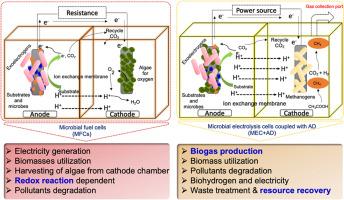生物电化学系统的进展:电生菌和产甲烷菌的行为,压力适应,以及可持续生物能源的人工智能驱动方法
IF 16.3
1区 工程技术
Q1 ENERGY & FUELS
引用次数: 0
摘要
微生物燃料电池(MFCs)和微生物电解电池集成厌氧消化(MECs-AD)是生物电化学系统(BES)的新兴技术,可以提高生物(大量)废物的生物能源生产。本文综述了mfc和MECs-AD中微生物(即电原菌和产甲烷菌)的技术和生物学方面的认识。重点在于阐明BES的生物电化学,复杂的微生物行为,以及微生物接种策略(如纯菌株,混合联合体,基因工程和生物增强)作为单培养和共培养。本文系统地讨论了mfc中抑制产甲烷菌和mec - ad系统中增强电原的方法。讨论了电活性菌、产甲烷古菌和纳米线在BES电原中的协同作用。应用应力(例如,盐度,温度波动,pH值极值,水力/剪切应力,电磁场和化学抑制剂)来稳定功能微生物也进行了探索。建议在BES上实施混合胁迫有利于稳定微生物群落。重点介绍了人工智能(AI)驱动的应变设计和机器学习(ML)在BES中的进展。神经网络和随机森林算法可以预测基因敲除/插入,以最大化电子转移。因此,需要进一步研究利用AI和ML算法实现转基因菌株。该综述的发现强调了在微生物生态学、材料科学和计算建模的交叉领域继续研究的必要性,以释放BES系统的全部潜力。本文章由计算机程序翻译,如有差异,请以英文原文为准。

Advancements in bioelectrochemical systems: Electrogens and methanogens behaviour, stress adaptation, and artificial intelligence-driven approaches for sustainable bioenergy
Microbial fuel cells (MFCs) and microbial electrolysis cells integrated anaerobic digestion (MECs-AD) are the emerging technologies of bioelectrochemical systems (BES) that enhance bioenergy production from bio(mass)waste. This review has been dedicated to the understanding of technical and biological aspects of microbes (i.e., electrogens and methanogens) in MFCs and MECs-AD. A key focus lies in elucidating the bioelectrochemistry of BES, complex microbial behavior, and strategies for microbial inoculation (such as pure strains, mixed consortium, genetic engineering, and bioaugmentation) as mono-cultures and co-cultures. Approaches for methanogen suppression in MFCs and electrogens enhancement in MECs-AD systems are addressed systematically. The synergy between electroactive bacteria, methanogenic archaea, and nanowires in electrogens of BES is discussed. The application of stress (e.g., salinity, temperature fluctuations, pH extremes, hydraulic/shear stress, electromagnetic fields, and chemical inhibitors) to stabilize functional microbes is also explored. The implementation of mixed stresses on BES is recommended to be beneficial in stabilizing microbial communities. Highlights the artificial intelligence (AI) driven strain design and machine learning (ML) advancements in BES. Neural networks and random forest algorithms can predict gene knockouts/insertions to maximize electron transfer. Therefore, further research is needed to implement genetically modified strains using AI and ML algorithms. The review's findings underscore the need for continued study at the intersection of microbial ecology, materials science, and computational modeling to unlock the full potential of BES systems.
求助全文
通过发布文献求助,成功后即可免费获取论文全文。
去求助
来源期刊

Renewable and Sustainable Energy Reviews
工程技术-能源与燃料
CiteScore
31.20
自引率
5.70%
发文量
1055
审稿时长
62 days
期刊介绍:
The mission of Renewable and Sustainable Energy Reviews is to disseminate the most compelling and pertinent critical insights in renewable and sustainable energy, fostering collaboration among the research community, private sector, and policy and decision makers. The journal aims to exchange challenges, solutions, innovative concepts, and technologies, contributing to sustainable development, the transition to a low-carbon future, and the attainment of emissions targets outlined by the United Nations Framework Convention on Climate Change.
Renewable and Sustainable Energy Reviews publishes a diverse range of content, including review papers, original research, case studies, and analyses of new technologies, all featuring a substantial review component such as critique, comparison, or analysis. Introducing a distinctive paper type, Expert Insights, the journal presents commissioned mini-reviews authored by field leaders, addressing topics of significant interest. Case studies undergo consideration only if they showcase the work's applicability to other regions or contribute valuable insights to the broader field of renewable and sustainable energy. Notably, a bibliographic or literature review lacking critical analysis is deemed unsuitable for publication.
 求助内容:
求助内容: 应助结果提醒方式:
应助结果提醒方式:


